Last Updated on June 9, 2023
In Defense of Gold-digging Governesses: The Cunning of Becky Sharp
In her review of the new TV series “Vanity Fair,” guest writer Amy Holley-Cribbin brings us up to speed on being a governess in the 1800s.
The story, written in the Victorian era, is set between 1814–1832 during the Napoleonic Wars at the close of the Georgian era. Holley-Cribbin examines how the novel, and the 2018 adaptation, “pick up on the anxiety that was felt about governesses in the 1800s,” well into the Victorian era, and why we should feel for Becky.
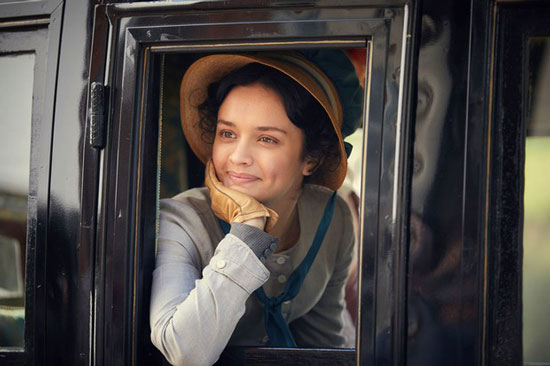
“Vanity Fair” (2018): In a world where everyone is striving for what is not worth having, no one is more determined to climb to the heights of English Society than Miss Rebecca Sharp.
Starring Olivia Cooke, Claudia Jessie, Tom Bateman, Johnny Flynn, Michael Palin.
“Vanity Fair” (2018) is AVAILABLE to STREAM
Rated TV-14
![]()
ITV’s latest adaptation of W.M. Thackeray’s “Vanity Fair” starring Olivia Cooke as the clever Becky Sharp is every bit the same “novel without a hero” that Thackeray wrote. Becky Sharp’s determination to make her way into society comes across vividly in the 2018 adaptation, as she sets her sights tenaciously at man after man as a means of raising her position in the world. She is wholeheartedly prepared to do anything to escalate her course through society’s ranks, which reflects Victorian society’s anxieties about the dangers possible in inviting a governess into their homes.
Michael Palin plays Thackeray, and narrator, in this adaptation. At the beginning of episode one as the credits end, he declares that “Vanity Fair” is a “world where everyone is striving for what is not worth having” and that it is “a very vain, wicked, foolish place, full of all sorts of humbug falseness and pretension.” This provides an expert exposition about how the characters and the plot should be understood by the audience, and that “Vanity Fair” is a microcosm of British society.
In the opening scene of the first episode, Miss Pinkerton, the headmistress of the school in which Becky teaches, makes it quite clear that Becky will probably be devious and manipulative on her path to achieving the life she feels that she deserves. Miss Pinkerton advises Becky that ‘she forgets her station’ and that “if you think that because you are clever, society will overlook your low birth, then I fear the real world will come as a dreadful shock to you.” Becky’s response to her employer, and former headmistress, “I do yes, why not? I’m the only person under your roof who has the first idea what the real world looks like.” Becky sets out to make “every day better than the last” and the director largely encourages the viewer to sympathize with Becky as she tries to elevate her social standing.
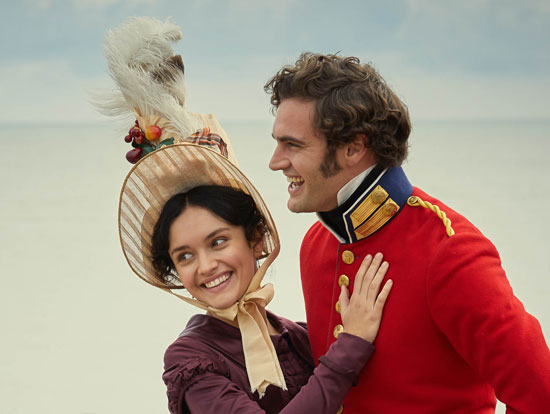
Gwyneth Hughes script for this latest adaptation reveals the condescending attitudes that often existed about governesses in nineteenth-century Britain. The novel, and the 2018 adaptation, pick up on the anxiety that was felt about governesses in the 1800s. When Becky marries Rawdon Crawley, the second son of Lord Crawley (who also wanted to marry her), the wealthy spinster Miss Crawley angrily calls Becky a “treasure hunter.” This phrase is not used in the novel; Becky is called a ‘nobody’, ‘governess’, ‘the daughter of an opera girl’ but not a “treasure hunter”. As such the adaptation intensifies the genuine concern that was felt about the possibility of relationships flourishing between a governess and any of the gentlemen residing in the home of her employment.
In nineteenth-century literature, the figure of the governess is frequently linked romantically to her employer. In her book The Victorian Governess, Kathryn Hughes writes “[w]e know her best in the form of the scandalous Becky Sharp of Thackeray’s Vanity Fair, or as Charlotte Brontë’s “Jane Eyre,” the plain orphan who eventually marries her employer, the mysterious Mr Rochester” (Hughes 2001: xi). Both characters caused controversy for their ‘marrying up’ in defiance of their position in the social hierarchy. Both Jane Eyre and Becky Sharp were also determined to do better for themselves despite people like Miss Pinkerton who told Becky that ‘she forgets her station’, or people like Eyre’s Aunt Reed standing in their way. Concern about governesses proliferated for one significant reason in the Victorian era: they had exploded in number.
This huge increase “was a direct consequence of the increased wealth of the nation, epitomised by the success of industrialists and financiers, but shared by a growing middle class” (Hughes 2001: 11) in the nineteenth-century. Many middle-class families had made their fortunes in the Industrial Revolution, but simply becoming rich was not enough for the aspirant middle classes. They wanted to make a “bid for the moral, political and intellectual leadership of the country … [and they did this by revising] the terms ‘lady’ and ‘gentleman’” (Hughes 2001: 12). A woman becoming, and indeed being accepted as, a ‘lady’ was a crucial indicator of the status of the master of the house.
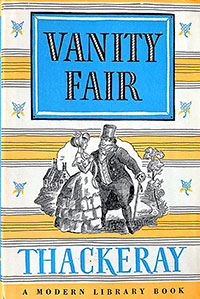 It was not enough for the women in nineteenth century middle-class homes to be ‘ladies of leisure’. Victorian society’s requirement that women were accomplished meant that the governess was a critical part of nineteenth century middle-class home.
It was not enough for the women in nineteenth century middle-class homes to be ‘ladies of leisure’. Victorian society’s requirement that women were accomplished meant that the governess was a critical part of nineteenth century middle-class home.
Chosen “as much for her moral as her intellectual qualities, the governess was responsible for the total welfare of young charges. While she was competent to instruct in a wide range of academic subjects, her main task was to provide the round-the-clock moral and social supervision that her employer was unable to supply” (Hughes 2001: 21). However, because ‘ladyhood’ “could only be absorbed from a suitably refined home environment” (Hughes 2001: 21), governesses needed to be gentlewomen. As such, many governesses were the daughters of clergymen, from families of reduced circumstances (possibly after the unexpected death of the father) or unwed women from distant branches of the family, like cousins and nieces.
This peculiar background meant that the Victorian governess was neither a member of the family, nor a servant. She walked a perilous and lonely social path in the home of her employer. As an unmarried, young woman unrelated to her employer, the Victorian governess often found herself at risk of receiving unwanted sexual attention. Hughes alleges that as a woman who worked for her living, the governess was associated with the working-class woman, whose sexual aggressiveness was seen as inseparable from her economic independence and consequent liberation from her father’s or husband’s home. But while, with the exception of the maidservant, the working-class woman remained outside the front door of the wealthy middle-class household, the governess took up her position at its very heart, bringing with her the explosive threat of unregulated sexuality (Hughes 2001: 119).
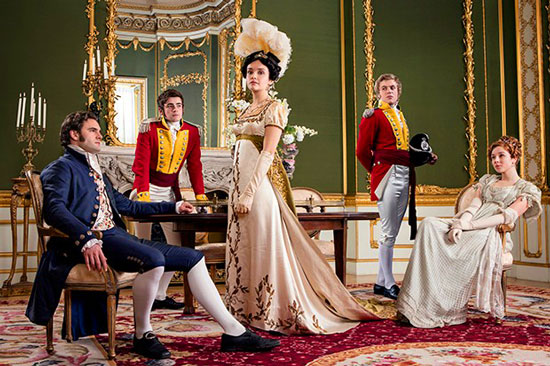
In Hughes’ 2018 adaptation, Becky fights off the advances of both father and son while she is in the Crawley’s house, as both are intent on worming their way into her bed.
While many governesses entered the occupation solely with the intention of saving their families from destitution, there were some, like Thackeray’s Becky, who saw the occupation as a means of raising their social position. The “1861 census data for Paddington [reveals] that a certain number of women were attracted to the schoolroom ‘for the sake of social advancement, just as men go into the Church or the army in order to become gentlemen by profession’”(Hughes 2001: 32).
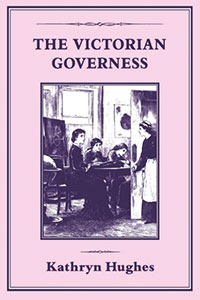 This, alongside the fact that entering a wealthy home could put a governess in the position of being able to marry well, might explain why governesses were demonized as ‘treasure hunters’. Becky absolutely set out on marrying well. Gwyneth Hughes’ Amelia Sedley asks Becky on the eve of her own wedding to George, whether Becky married Rawdon for love. Becky, for the sake of appearance no doubt, tells Amelia that they are still in the honeymoon phase of their relationship, but Becky’s financial situation looks increasingly bleak at this point. The viewer is reminded of Rawdon’s question to Becky, delivered naked in their marital bed: “you’re not regretting it, are you?… because you could’ve married the lord of the manor instead.”
This, alongside the fact that entering a wealthy home could put a governess in the position of being able to marry well, might explain why governesses were demonized as ‘treasure hunters’. Becky absolutely set out on marrying well. Gwyneth Hughes’ Amelia Sedley asks Becky on the eve of her own wedding to George, whether Becky married Rawdon for love. Becky, for the sake of appearance no doubt, tells Amelia that they are still in the honeymoon phase of their relationship, but Becky’s financial situation looks increasingly bleak at this point. The viewer is reminded of Rawdon’s question to Becky, delivered naked in their marital bed: “you’re not regretting it, are you?… because you could’ve married the lord of the manor instead.”
To my mind, this question provides the evidence for finding sympathy for Becky. She is not a manipulative, devious gold-digger. In the novel and in ITV’s adaptation, Sir Pitt Crawley is besotted with Becky’s cleverness. Cunning Becky knew this to be true and charmed her way to the position of Sir Pitt Crawley’s secretary. Had she been entirely set on achieving the highest social position possible, Becky would have done better to stay at Queen’s Crawley a bit longer, rather than running away with the Sir Pitt Crawley’s second son.
Gwyneth Hughes’ adaptation expertly weaves fidelity to the original novel with a fresh approach to Thackeray’s much-loved book. Palin’s (as Thackeray) prompts at the start of the episodes, the modern score, and Becky’s knowing looks delivered directly to the camera, highlight the continued relevance of the book’s themes. They remind us that the twenty-first century too is a “world where everyone is striving for what is not worth having,” a “Vanity Fair”. In truth, at times we are all Becky Sharp.
Add it to your WATCHLIST or STREAM
![]()
Amy Holley-Cribbin is a writer for Gloucestershire-based production company Nomadic Creatives Ltd. She is in the final weeks of completing a PhD specialising in adaptation theory and Victorian literature. She is a member of NAVSA and has delivered papers at academic conferences in the UK as well as internationally.
If you enjoyed this post, be sure to see The Period Films List, with the best British, historical and costume dramas sorted by era. You’ll especially like the Best Period Dramas: Victorian Era List.



